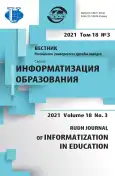Технология проектирования индивидуальных образовательных траекторий в рамках научно-исследовательской практики обучающихся
- Авторы: Осиповская Е.А.1, Пшеничный Н.Г.2, Харахордина М.В.1
-
Учреждения:
- Онлайн-университет Skillbox
- Университет ИТМО
- Выпуск: Том 18, № 3 (2021)
- Страницы: 203-211
- Раздел: ПЕДАГОГИКА И ДИДАКТИКА ИНФОРМАТИЗАЦИИ
- URL: https://journal-vniispk.ru/2312-8631/article/view/321211
- DOI: https://doi.org/10.22363/2312-8631-2021-18-3-203-211
- ID: 321211
Цитировать
Полный текст
Аннотация
Проблема и цель. Рассматривается процесс разработки программы дополнительного образования с использованием информационно-коммуникационных технологий (ИКТ) в рамках научно-образовательного центра (НОЦ) Инфохимии, созданного на базе Университета ИТМО. Процесс разработки программы включал следующие этапы: брифинг с заказчиком, изучение контекста, построение гипотезы и ее проверка, апробация элементов программы, проектирование образовательного опыта обучающихся, защита проекта. Методология. Для создания программы, релевантной интересам целевой аудитории, проанализирован опыт предыдущего набора обучающихся учебной практики по направлению «Инфохимия». Для этого проведены глубинные интервью, в ходе которых респонденты рассказали о своих научных достижениях, трудностях и поделились рекомендациями по улучшению программы. В рамках исследования контекста изучен опыт российских и зарубежных вузов по смежным направлениям: биология, химия, физика и IT. Например, рассмотрены программы подготовительной подготовки таких университетов, как Stanford University Mathematics Camp (SUMaC), Stanford University Science Circle, Harvard University Summer School (Pre-College Program), Chemistry Research Academy of University of Pennsylvania. В результате выявлены три формата научно-исследовательской практики: летний лагерь или школа, научный кружок и академия исследований. Результаты. Обнаружено, что ни одна программа дополнительного образования вузов России в области химии не использует формат иммерсивного обучения, как это реализовано в Университете ИМТО. НОЦ Инфохимии осуществляет погружение школьника в научно-образовательную среду посредством проведения экспериментов в лабораториях с использованием высокотехнологического оборудования под руководством ведущих ученых. Разработана концепция программы, основанная на модели Science Education (образование через науку), основными элементами которой стали индивидуальный трек обучения, поддерживающие мероприятия и участие в реальном научно-исследовательском проекте. Для подтверждения необходимости использования в программе информационных технологий и социальных сетей, найдены подтверждения в виде результатов исследований университетов University College Dublin и University of Melbourne. Заключение. Основой программы стали гибкие образовательные траектории и разные уровни персонализации: проект, поддержка со стороны сотрудников научно-образовательного центра, скорость прохождения, учебный материал, образовательный результат.
Об авторах
Елизавета Андреевна Осиповская
Онлайн-университет Skillbox
Автор, ответственный за переписку.
Email: e.osipovskaya@gmail.com
ORCID iD: 0000-0002-4192-511X
кандидат филологических наук, лектор
Российская Федерация, 121205, Москва, Ленинский пр-кт, д. 6, стр. 20Николай Гурьевич Пшеничный
Университет ИТМО
Email: psh@itmo.ru
ORCID iD: 0000-0001-6423-9078
начальник отдела по профессиональной ориентации и работе с талантами
Российская Федерация, 197101, Санкт-Петербург, Кронверкский пр-кт, д. 49АМарина Викторовна Харахордина
Онлайн-университет Skillbox
Email: marina.kharakhordina@skillbox.ru
ORCID iD: 0000-0002-0935-5858
руководитель методического отдела
Российская Федерация, 121205, Москва, Ленинский пр-кт, д. 6, стр. 20Список литературы
- Zhang L, Basham JD, Yang S. Understanding the implementation of personalized learning: a research synthesis. Educational Research Review. 2020;31:100339. https://doi.org/10.1016/j.edurev.2020.100339
- Jackson J, Dukerich L, Hestenes D. Modeling instruction: an effective model for science education. Science Educator. 2008;(7(1)):10-17.
- Weber H, Becker D, Hillmert S. Information-seeking behaviour and academic success in higher education: which search strategies matter for grade differences among university students and how does this relevance differ by field of study? High Education. 2019;(77):657-678. https://doi.org/10.1007/s10734-018-0296-4
- Osipovskaya E, Dmitrieva S, Grinshkun V. Examining technology and teaching gaps in Russian universities amid coronavirus outbreak. In: Auer ME, Rüütmann T. (eds) Educating Engineers for Future Industrial Revolutions. ICL 2020. Advances in Intelligent Systems and Computing. 2021;1328:764-774. https://doi.org/10.1007/978-3-030-68198-2_72
- Callinan JE. Information-seeking behaviour of undergraduate biology students: a comparative analysis of first year and final year students in University College Dublin. Library Review. 2005;(54(2)):86-99.
- Gkorezis P, Kostagiolas P, Niakas D. Linking exploration to academic performance: the role of information seeking and academic self-efficacy. Library Management. 2017;38(8-9):404-414.
- Chin C, Brown DE. Learning in science: a comparison of deep and surface approaches. Journal of Research in Science Teaching. 2000;(37(2)):109-138.
- Gray P. Self-directed education - unschooling and democratic schooling. Oxford Research Encyclopedia of Education. https://doi.org/10.1093/acrefore/9780190264093.013.80
- Blaschke LM. Heutagogy and lifelong learning: a review of heutagogical practice and self-determined learning. The International Review of Research in Open and Distributed Learning. 2012;(13(1)):56-71. https://doi.org/10.19173/irrodl.v13i1.1076
- Costello R, Shaw N. Personalised learning environments. HEA STEM (Computing): Learning Technologies Workshop, University of Hull. 26 Mar 2014. 2014. p. 4-11.
- Cochrane T, Bateman R. Smartphones give you wings: pedagogical affordances of mobile Web 2.0. Australasian Journal of Educational Technology. 2010;(26(1)):1-14.
- Blaschke LM, Porto S, Kurtz G. Assessing the added value of web 2.0 tools for e-learning: the MDE experience. Proceedings of the European Distance and E-Learning Network (EDEN) Research Workshop. Barcelona, 2010. Pp. 75-81.
- Fargason CA, Evans HH, Ashworth CS, Capper SA. The importance of preparing medical students to manage different types of uncertainty. Academic medicine. Journal of the Association of American Medical Colleges. 1997;(72(8)):688-692.
- Osipovskaya E, Pshenichny N, Khorokhordina M. Personalized learning in science education: designing an internship program for Russian high school students. INTED2021 Proceedings 15th International Technology, Education and Development Conference, March 8-9th, 2021, Valencia, Spain. p. 8523-8527. https://doi.org/10.21125/inted.2021.1754
- Kuznetsov AA, Grigoriev SG, Grinshkun VV, Levchenko IV, Zaslavskaya OYu. Informatics and ICT (information and communication technologies): 8th grade: textbook for educational institutions. Moscow: Drofa Publ.; 2010. (In Russ.)
Дополнительные файлы









